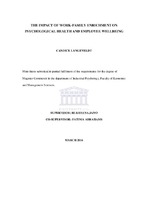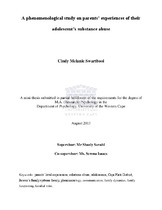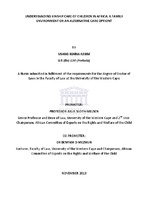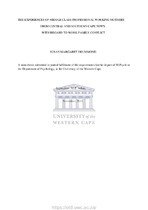The impact of work-family enrichment on psychological health and subjective wellbeing
Abstract
Work and family are the central and salient domains in an individual's life. Juggling
work and family life have always been a challenge for many employees and families (Hammer et al., 2005). However, with the increased interest in the construct of workfamily enrichment, more attention was given to the positive influences across the life domains. Grzywacz and Butler (2005) found that work-family enrichment improved mental and physical well-being. The objective of this study was twofold; (i) to explore and add to existing research done on work-family enrichment and (ii) investigate the relationships between workfamily enrichment, psychological health and subjective wellbeing of employees within a financial services organisation in South Africa. Three hundred and forty seven questionnaires were administered and one hundred and sixty eight completed
questionnaires were returned. Purposive sampling was used to select employees to participate in the study. Data was collected by a self-developed biographical questionnaire, Calson, Kacmar, Wayne, and Grzywacz's (2006) Enrichment Scale, General Health Questionnaire developed by Kalliath, O'Driscoll and Brough (2004) and the Personal Wellbeing Index developed by the International Wellbeing Group (2006). The Statistical Package for Social Sciences (SPSS) was used to analyse the data and to interpret the descriptive and inferential statistics. Specifically the Pearson Moment Correlation analysis and the T-Test was used. The results indicated that a relationship between work-to-family enrichment and psychological health exist. There was a significant relationship for family-to-work enrichment and psychological health. Furthermore, results indicated a significant relationship between work-to-family enrichment and subjective wellbeing. A significant relationship between family-to-work enrichment and subjective wellbeing was also found. However, no significant differences were found for gender for both work-to-family and family-to-work enrichment. Future considerations, theoretical implications and recommendations for organisations are discussed.
Related items
Showing items related by title, author, creator and subject.
-
A phenomenological study on parents' experiences of their adolescent's substance abuse
Swartbooi, Cindy Melanie (2013)Adolescent substance abuse is a widely researched area both internationally and nationally. It has been known to affect many problems which are prevalent in most low socioeconomic communities such as crime, school truancy ... -
Understanding kinship care of children in Africa: a family environment or an alternative care option?
Assim, Usang Maria (University of Western Cape, 2013)In Africa generally, orphaned and vulnerable children are traditionally cared for by their relatives or close family friends; this is an abiding practice even in contemporary times. This was historically considered to be ... -
The experiences of middle-class professional working mothers from central and Southern Cape Town with regard to work-family conflict
Drummond, Susan Margaret (University of the Western Cape, 2011)Women’s roles in the workplace have increased but expectations within their family roles have not diminished. Work-family conflict (WFC) occurs when work and family roles are mutually incompatible in some respect. Mothers’ ...




